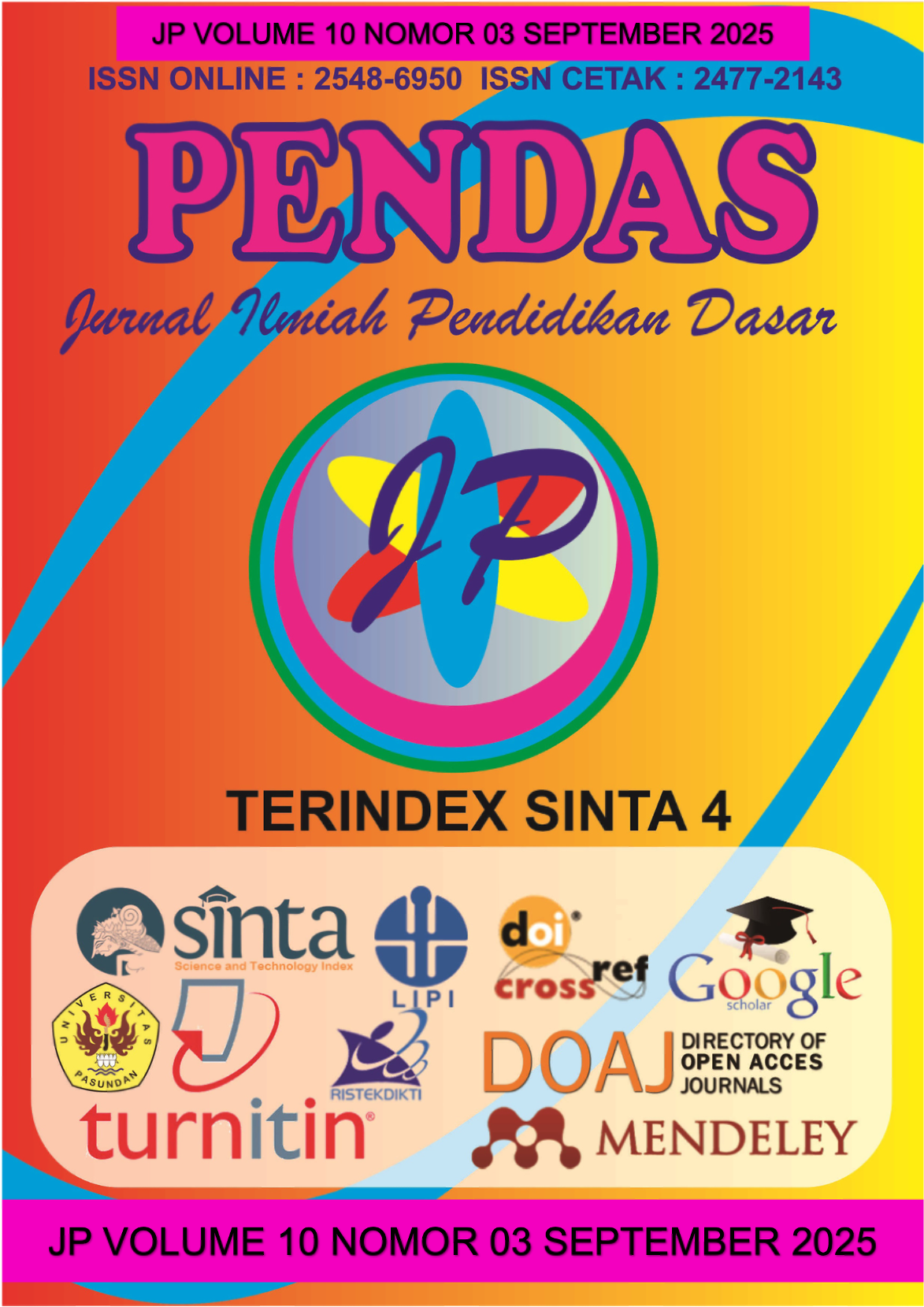PENGEMBANGAN LKPD BERBASIS PROBLEM BASED LEARNING UNTUK MENINGKATKAN KEMAMPUAN BERPIKIR KRITIS SISWA SD PADA PEMBELAJARAN MATEMATIKA
DOI:
https://doi.org/10.23969/jp.v10i03.31653Keywords:
LKPD, Problem Based Learning, critical thinking, mathematics, elementary school ABSTRAK Penelitian ini bertujuanAbstract
This study aims to determine the effectiveness of the use of Student Worksheets
(LKPD) based on Problem Based Learning (PBL) in improving students' critical
thinking skills in mathematics subjects in grade 5 of elementary school. The
research method used is classroom action research with a pre-test and post-test
design. The subjects of the study were 20 students of grade 5 of UPTD SDN 1 Metro
Selatan. The research data were obtained through a critical thinking ability test
carried out before (pretest) and after (posttest) the implementation of LKPD based
on PBL. The results showed a significant increase in students' critical thinking skills.
The average pretest score of 52.25 increased to 78.5 in the posttest, with an
average increase of 26.25 points or 50.24%. Individual analysis showed that all
students (100%) experienced an increase in scores from pretest to posttest. A total
of 16 students (80%) managed to achieve scores above 75 in the posttest, indicating
a good level of mastery of critical thinking skills. The results of this study prove that
PBL-based LKPD is effective in improving students' critical thinking skills in
mathematics learning. The PBL approach that presents contextual problems
encourages students to think analytically, evaluatively, and creatively in solving
mathematical problems. This study recommends the use of PBL-based LKPD as an
alternative learning strategy to develop high-level thinking skills in elementary
school students.
Downloads
References
Ennis, R. H. (2011). The Nature of
Critical Thinking: An Outline of
Critical Thinking Dispositions and
Abilities. University of Illinois.
Ghofur, A. (2013). Problem Based
Learning for Math and Science.
Skylight Training and Publishing
Inc.
Hake, R. R. (1999). Analyzing
change/gain scores. Unpublished
Manuscript. Indiana University.
Hmelo-Silver, C. E. (2004). Problem-
based learning: What and how do
students learn? Educational
Psychology Review, 16(3), 235–
266. https://doi.org/10.1023/B:ED
PR.0000034022.16470.f3
Kurniawati, N. (2018). Mengakses
dan memonitor kemampuan
berpikir kreatif matematis siswa
kelas V sekolah dasar dalam
pembelajaran matematika.
PRISMA, 7(1).
https://doi.org/10.35194/jp.v7i1.3
62
Mashudi, M. (2021). Pembelajaran
modern: Membekali peserta didik
keterampilan abad ke-21. Al-
Mudarris (Jurnal Ilmiah
Pendidikan Islam), 4(1).
https://doi.org/10.23971/mdr.v4i1
.3187
Masrinah, E. N., Aripin, I., Gaffar, A.
A., Biologi-fkip, P. S. P., &
Majalengka, U. (2019). Problem
Based Learning ( Pbl ) Untuk
Meningkatkan. Seminar Nasional
Pendidikan, 5.
Masrinah, E. N. dkk. (2019). Problem
Based Learning (PBL) untuk
meningkatkan keterampilan
berpikir kritis. Seminar Nasional
Pendidikan, 1.
Mbagho, H. M., & Tupen, S. N.
(2020). Pembelajaran
Matematika Realistik dalam
Meningkatkan Hasil Belajar
Matematika Materi Operasi
Bilangan Pecahan. Jurnal
Basicedu, 5(1).
https://doi.org/10.31004/basicedu
.v5i1.632
Oktaviani, A. D., Shoffan, S., &
Kristanti, F. (2023). Kemampuan
berpikir kritis dalam
pembelajaran Matematika. JET:
Journal of Education and
Teaching, 4(2).
Prastowo, A. (2013). Panduan kreatif
membuat bahan ajar inovatif.
Yogyakarta: Diva Press.
Susilawati, & Rosidah, A. (2020).
Model pembelajaran SSCS
(Search Solve Create and Share)
terhadap pemahaman konsep
siswa sekolah dasar. Prosiding
Seminar Nasional Pendidikan
FKIP UNMA 2020.
Trianto. (2017). Mendesain model
pembelajaran inovatif-progresif.
Jakarta: Kencana. Dinda, D.,
Ambarita, A., Herpratiwi, &
Nurhanurawati. (2021).
Downloads
Published
Issue
Section
License
Copyright (c) 2025 Pendas : Jurnal Ilmiah Pendidikan Dasar

This work is licensed under a Creative Commons Attribution 4.0 International License.














































